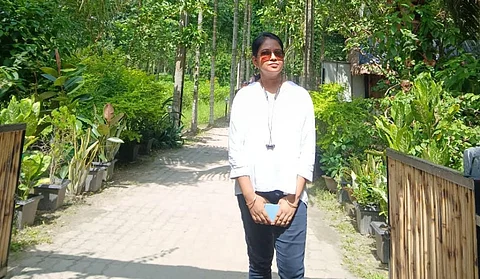
- Home
- Live Blog
- Breaking News
- Top Headlines
- Cities
- NE News
- Sentinel Media
- Sports
- Education
- Jobs

OUR CORRESPONDENT
TEZPUR: Tezpur, the cultural capital of Assam and the district headquarters of Sonitpur, lies at the heart of a region where lush tea gardens merge with the tranquil foothills of rural landscapes. Amid this serene backdrop, a quiet revolution is transforming the local economy and the lives of villagers. Leading this wave of change is Manmoyuri Devi, a soft-spoken yet resolute woman from Hugrajuli village under Dhekiajuli LAC in Sonitpur district, who has emerged as a pioneer of rural tourism and organic entrepreneurship. Her journey is not defined by inherited privilege or formal training, but by vision, perseverance, and an unwavering bond with the land. Today, Manmoyuri Devi stands as an inspiring woman entrepreneur who, alongside her husband Pranab Nath, has successfully established two notable ventures Assamica Agro Pvt. Ltd., a thriving organic tea brand, and Kanoka Village Resort, a leading rural tourism destination. The family’s journey began on their own land, located in a quiet corner of Hugrajuli. Without any external funding or business background, they chose to rely on self-funding, hard work, and the resources available to them. What started as a modest effort to grow tea organically soon evolved into Assamica Agro, launched in 2010 with a vision to produce high-quality, chemical-free Assamese tea.
The early years were filled with trials. Certification for organic produce was complex and costly, access to broader markets was limited, and online visibility was almost non-existent. Yet, Manmoyuri Devi believed in doing things the right way. She involved local farmers, introduced them to organic methods, and ensured ethical wages and fair treatment for all involved.
Instead of flashy marketing campaigns, Assamica Agro took a different route. The brand focused on storytelling through authenticity showing real-life images of tea garden workers, local women plucking leaves, and village children playing in the fields. On social media and their website, the brand built a connection with customers by celebrating rural life and the people who form its backbone.
After the success of Assamica Agro, the family began exploring ways to further support the local community and share their rural way of life with a wider audience. This vision gave birth to Kanoka Village Resort in 2018, a bold step into the realm of eco-friendly rural tourism.
Talking to The Sentinel, Manmoyuri Devi said that the idea behind the resort was simple but powerful. “We wanted people from cities to come and live as we do, to stay in traditional homes, taste local food, and understand how closely our lives are connected with nature.” Built in the middle of their tea gardens, the resort offers guests an immersive village experience including tea leaf plucking, ethnic Assamese meals, nature walks, and cultural interactions with the local community.
Kanoka Village Resort has not only become a serene getaway for urban travellers but also a lifeline for local employment. More than 100 individuals, including many rural women and youth, are now engaged directly or indirectly with the operations of the resort in hospitality, housekeeping, guiding, and artisanal production. The resort is a testament to how rural tourism can be a catalyst for inclusive and sustainable development.
What sets Manmoyuri Devi apart is not just her achievements but the way she leads. As Director of both Assamica Agro and Kanoka Village Resort, she handles everything from finances to human resource management, training staff, and ensuring daily operations run smoothly. She does this without any formal business education with her strength lying in practical experience, deep community ties, and an unshakable work ethic.
Beyond business, she mentors other village women, encouraging them to start small enterprises or get involved in local tourism and agriculture. She organizes informal training sessions, provides guidance on financial literacy, and promotes self-reliance among rural women. Her influence is not only economic but deeply social she is quietly transforming attitudes, breaking gender norms, and nurturing future women leaders in her community.
Manmoyuri Devi’s journey reflects a larger shift happening across Assam, where women entrepreneurs are stepping into roles once thought inaccessible. In agriculture, handloom, food processing, and rural tourism, women are becoming not just contributors but decision-makers and innovators. They are challenging societal norms, creating job opportunities, and driving grassroots development. As more women like Manmoyuri take charge, rural Assam is witnessing a new chapter one where gender equality, economic growth, and cultural preservation go hand in hand.
From the quiet fields of Hugrajuli to global tea lovers and travellers from across the country, Manmoyuri Devi’s story is an example of what rural India can achieve with the right mix of vision, integrity, and community spirit. Her ventures born out of local resources and powered by local people are sustainable models for rural entrepreneurship and tourism.
She hasn’t just created businesses but built bridges between the urban and the rural, the traditional and the modern, and the past and the future.
In her own words, “If we believe in our roots and grow with honesty, there is no limit to what our villages can become.” Indeed, in a world chasing rapid industrialisation, Manmoyuri Devi has shown that sustainable progress can bloom gently leaf by leaf, guest by guest, and village by village.
Also Read: SAMP Organizes Day-long Workshop in Sivasagar, Emphasizes Expansion into Tea Garden Areas
Also Watch: